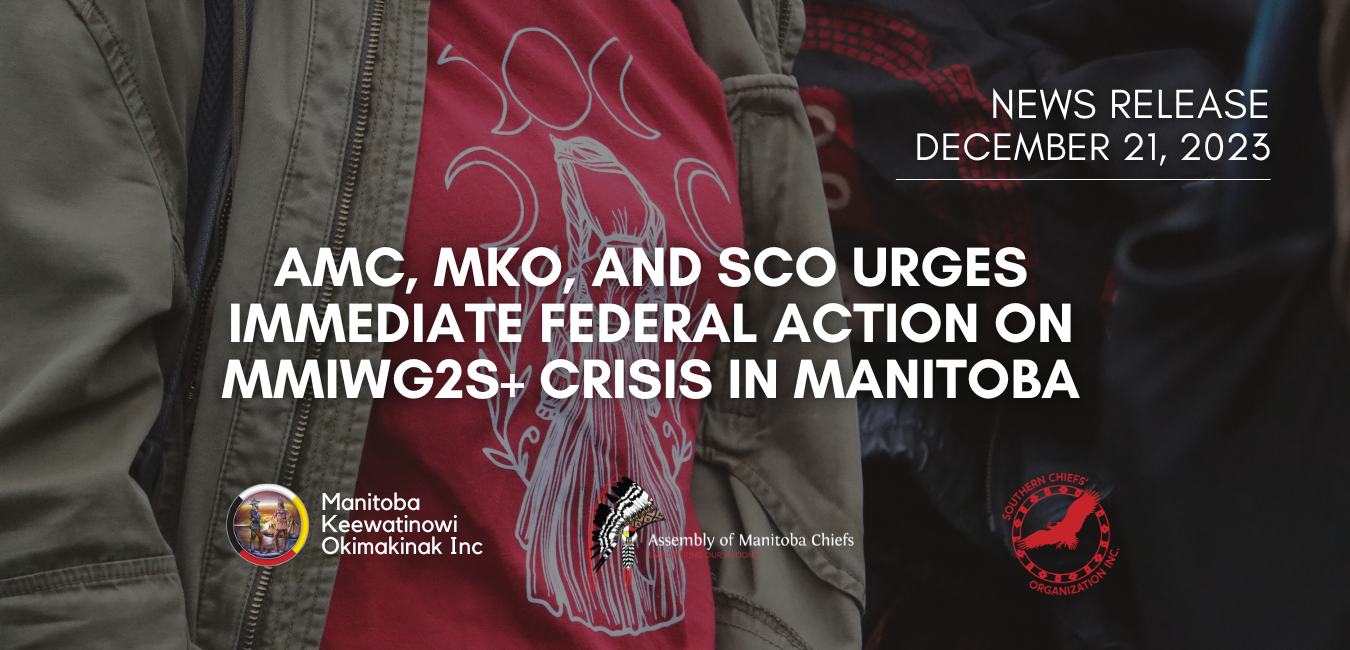AMC, MKO, and SCO Urges Immediate Federal Action on MMIWG2S+ Crisis in Manitoba

December 20, 2023
Treaty One Territory, Manitoba
AMC Communications
Treaty One Territory, Manitoba – The Assembly of Manitoba Chiefs (AMC), the Manitoba Keewatinowi Okimakanak (MKO), and the Southern Chiefs Organization (SCO) urgently call on the federal and provincial governments to address the grave safety concerns affecting First Nations people in Manitoba. Following a recent Winnipeg Police Service announcement of the attempted murder of a First Nations woman, forcibly confined and assaulted, the AMC, MKO, and SCO emphasize the urgent need for decisive action to address the alarming rates of violence disproportionately impacting First Nations women, girls, and Two-Spirited individuals (MMIWG2S+).
Since March 2022, we have witnessed an appalling surge in murders, disappearances, and instances of neglect when our people are in distress. In the past 12 months alone, 25 female victims of homicide and over 400 missing women, girls, and Two-Spirited individuals have been reported by December 2023. With approximately 77,051 First Nation individuals residing off-reserve in Manitoba, nearly half of whom call Winnipeg home, the gravity of the situation cannot be overstated.
This crisis extends beyond isolated acts of violence; it represents a broader epidemic that has led to an unprecedented number of women, girls, and two-spirited individuals bearing the brunt of these atrocities.
“The lack of decisive action by governments has resulted in severe harm against First Nations women, who are now facing unprecedented levels of violence,” says Grand Chief Cathy Merrick, “We are deeply concerned about historical perspectives, where the previous government pushed the narrative that First Nations women are disposable. Today, we are witnessing the tragic consequences of such harmful and unregulated political rhetoric, and we question where is the accountability for these words that seem to correlate to the rise of violence against our women.”
“Our people continue to suffer from the effects of intergenerational trauma stemming from the Residential School System, 60’s Scoop, Systemic Racism and colonization,” says MKO Grand Chief Garrison Settee. “Our people continue to live with emotional and spiritual wounds that are not healing, which results in high rates of lateral violence. There have been a number of inquiries that have offered a starting point to begin addressing these issues, such as the Aboriginal Justice Inquiry (AJI) recommendations as a result of the shooting of J.J Harper, the National Inquiry into Missing and Murdered Indigenous Women and Girls from 2019 and the 2015 Truth and Reconciliation Commission of Canada Calls to Action. The lack of progress on the recommendations on these calls to action by the federal and provincial governments will only continue to hinder the Healing Journeys of Indigenous People, which in turn will result in continued violence,” says Grand Chief Settee. “Our Nations need immediate and meaningful support and action so our women, men, and children can be safe.”
“In our commitment to justice and equity, the Southern Chiefs Organization calls upon all levels of government, law enforcement, and the community to work collaboratively to address and eradicate the violence that disproportionately affects First Nations women, girls and two-spirited individuals in Winnipeg,” said Grand Chief Jerry Daniels.
Furthermore, the AMC, MKO, and SCO are deeply concerned that the focus of our Prime Minister and Premier on international matters, such as conflicts in the Middle East, has diverted attention from the pressing issues facing our own people of Winnipeg. The AMC, MKO, and SCO call for immediate action, urging the Premier to fulfill the “Tough on Crime” commitment made before the election, ensuring citizens’ safety. Additionally, the AMC, MKO, and SCO demand immediate action to rectify the chronic underfunding of essential programs and services, as alarming rates of violence disproportionately impact First Nations women, girls, and two-spirited individuals in the province.
Elder Sherry Copenace from the AMC Elders Council reminds us, “As First Nations Peoples, and in accordance with our own laws and traditions, we embrace the responsibility for each other’s well-being, acknowledging the intricate web of connections that bind us together. We recognize that the gifts bestowed upon us by the Creator are meant to be used with honour and respect, fostering a commitment to care for and protect one another with love and compassion, reflecting the values shared across the diverse First Nations in Manitoba.”
The violence we are perpetuating against ourselves and others must come to an end.
For more information, please contact:
Communications Team
Assembly of Manitoba Chiefs
Email: media@manitobachiefs.com
For more information from MKO:
Naomi Clarke, MKO Communications
Phone: 204-612-1284
Email: naomi.clarke@mkonorth.com
Web: http://mkonation.com/
For more information from SCO:
Email: Media@scoinc.mb.ca
About AMC
The AMC was formed in 1988 by the Chiefs in Manitoba to advocate on issues that commonly affect First Nations in Manitoba. AMC is an authorized representative of 62 of the 63 First Nations in Manitoba with a total of more than 171,000 First Nation citizens in the province, accounting for approximately 12 percent of the provincial population. AMC represents a diversity of Anishinaabe (Ojibway), Nehetho / Ininew (Cree), Anishininew (Ojibwe-Cree), Denesuline (Dene) and Dakota Oyate (Dakota) peoples.
About MKO
Manitoba Keewatinowi Okimakanak Inc. (MKO) is a non-profit, political advocacy organization that has represented 26 First Nation communities in Manitoba’s North since 1981. The MKO represents more than 72,000 First Nations people.
About SCO
The Southern Chiefs’ Organization represents 34 First Nations and more than 85,500 citizens in what is now called southern Manitoba. SCO is an independent political organization that protects, preserves, promotes, and enhances First Nations peoples’ inherent rights, languages, customs, and traditions through the application and implementation of the spirit and intent of the Treaty-making process.